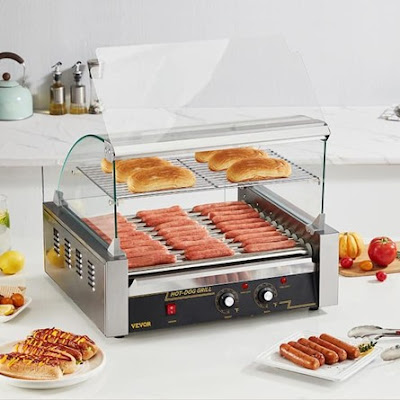Once
the crown jewel of convenience store foodservice, roller grills are quickly
becoming relics of the past. Once synonymous with grab-and-go ease, they are
now viewed by a growing segment of consumers as outdated, unappetizing, and
unsanitary. In an era where food quality and transparency drive purchasing
decisions, roller grills are struggling to retain relevance.
Consumer Skepticism Toward Roller Grills
Despite
their long-standing visibility behind the counter, roller grills today evoke
more skepticism than appetite. A recent Technomic consumer trend report found
that 53% of consumers under 35 actively avoid foods from roller grills,
citing concerns about freshness and ingredient quality. These perceptions
aren't unfounded. Roller grill foods—often ultra-processed and high in sodium
and preservatives—clash with modern preferences for “clean label” eating.
Steven Johnson,
the Grocerant Guru® at Tacoma, WA based Foodservice Solutions®,
emphasizes that “roller grills symbolize everything that today’s consumer is
walking away from: one-size-fits-all, processed food with little transparency
or customization.” Johnson notes that millennials and Gen Z, now the
dominant drivers of foodservice growth, expect “restaurant-quality” offerings
even from gas stations and corner stores.
Food Safety Concerns Undermine Trust
Food
safety remains a key concern. Unlike made-to-order meals prepared in sanitized,
controlled environments, roller grill items may sit unattended for hours, often
beyond recommended safe holding times. According to an FDA study, self-serve
hot foods rank among the top five retail food safety concerns, primarily
due to inconsistent temperature monitoring and the risk of cross-contamination.
The
COVID-19 pandemic further exposed these vulnerabilities. Many chains suspended
roller grill operations, and a notable percentage never reinstated them.
Retailers like Casey’s and Circle K pivoted to pre-packaged or fresh food
solutions instead, citing consumer anxiety over shared surfaces and airborne
contaminants.
Sales Declines and Industry Realignment
While
convenience store foodservice overall has been booming—growing at 10.2%
annually since 2020, according to NACS (National Association of Convenience
Stores)—roller grills have notably lagged behind. In 2024, foodservice
accounted for 22.58% of total in-store sales, yet roller grill items
represented less than 4% of that revenue, according to CSP Daily News.
Retailers
are reallocating floor space and budget toward made-to-order kitchens, smart
vending, and chef-curated grab-and-go options. “The grocerant trend—blending
grocery and restaurant quality—has obliterated tolerance for heat-lamped
mystery meats,” says Johnson.
“Consumers want control, flavor, and freshness. Roller grills offer none of
that.”
The Rise of Fresh and Fast Alternatives
Major
players in the c-store industry are responding. 7-Eleven
has expanded its fresh food selection by over 30% since 2021, investing in
premium sandwiches, salads, and protein bowls. Wawa has elevated its brand
perception with customizable hoagies and barista-style beverages, while Sheetz
continues to build its QSR-style made-to-order menu.
Even
brands that once relied heavily on roller grills are now reimagining their
offerings. Maverik and QuickTrip
are piloting digital ordering kiosks and fresh food kitchens, betting on
culinary innovation over spinning sausages.
The Future of Roller Grills
The
writing on the wall is clear. As consumer expectations evolve, the roller grill
has become less a symbol of convenience and more a warning sign of stale
thinking. Legacy equipment and processed products no longer satisfy the
standards of a food-savvy, health-conscious public.
Retailers
clinging to roller grills risk falling behind in an industry increasingly
driven by data, brand trust, and culinary credibility. “The convenience
store of 2030 will have far fewer roller grills,” Johnson predicts. “It’ll
have chefs, tech-driven customization, and food you’re proud to eat—not food
you grab because you’re out of options.”
Success Leaves Clues—Are You Ready to Find Yours?
One
key insight that continues to drive success is this: "The consumer is
dynamic, not static." This principle is the foundation of our work at Foodservice
Solutions®, where Steven Johnson, the Grocerant Guru®, has been
helping brands stay relevant in an ever-evolving market.
Want
to strengthen your brand’s connection with today’s consumers? Let’s talk.
Call 253-759-7869 for more information.
Stay Ahead of the Competition with Fresh Ideas
Is
your food marketing keeping up with tomorrow’s trends—or stuck in yesterday’s
playbook? If you're ready for fresh ideations that set your brand apart, we’re
here to help.
At
Foodservice Solutions®, we specialize in consumer-driven retail food
strategies that enhance convenience, differentiation, and
individualization—key factors in driving growth.
👉
Email us at Steve@FoodserviceSolutions.us
👉 Connect with us on social media:
Facebook,
LinkedIn,
Twitter







No comments:
Post a Comment